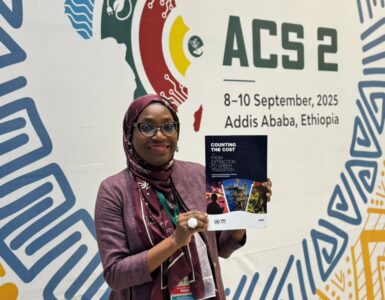‘Our lands and water bodies have been destroyed. Look at the size of cassava we harvest lately, It is very small. We are going hungry due to food shortages. And all these are attributed to the project’. Words of Madam P. (prefers anonymity) from Cameroon, who burst into tears after she took her turn at the introductory presentation during a weeklong African Development Bank (AfDB) Campaign Strategy meeting held in Guinea Conakry. The meeting was organized by WoMin, South Africa and its partners, Lumière Synergie pour le Développement (LSD), Senegal and le Comité pour l’Abolition des Dettes Illégitimes (CADTM) Afrique.
Madam P. was lamenting over the construction of the Nachtigal hydro dam financed by the AfDB.
The Nachtigal hydropower plant is a 420MW run-off-river hydropower project under development on the Sanaga River in Nachtigal, Cameroon. The hydropower facility is being developed by Nachtigal Hydro Power Company (NHPC), which is owned by Électricité de France (EDF, 40%), International Finance Corporation (IFC, 30%), and the Republic of Cameroon (30%). Construction of the plant began in 2018 and operations in 2023.
The Nachtigal hydropower project is situated on the Sanaga River near Nachtigal Falls and is located approximately 65km from Yaoundé, the Capital of Cameroon. The project area is located in the Guinea-Congolese rainforest, a transition zone between forest and savannah. Approximately 310 hectares of forest was cleared during the construction of the required infrastructure for the dam, including the hydroelectric power station, the water retention area and the electricity transmission line.
The communities rely on the forest for the collection of non-timber forest products that are used locally in traditional medicines and other traditional rites.
The locals of Sanaga also relied on the river for fishing, and the land for sand excavation, restoration, and agriculture.
Ghana, Burkina Faso, Cote D’Ivoire and Senegal are among countries that share similar tales with regard to AfDB and other IFC-funded projects.
Unfulfilled promises of employing the local youth, inadequate and sometimes no compensation for loss of livelihood, destruction of the ecosystem and reparation for the socio-cultural impact are among many downturns of such IFC-funded projects. The projects, therefore, become ‘The necessary evil’. ‘Necessary’ because they serve the Governments’ developmental agenda like electricity, road, railway etc., but ‘Evil’ because they are synonymous with poverty in affected communities.
‘Our youth can’t stay with us anymore because there are no jobs. They have left the community in search of greener pastures’, Madam P. bemoaned.
The AfDB Campaign Strategy meeting saw participants from eleven (11) countries spread across West, Central and Southern Africa, namely; Burkina Faso, Senegal, Ivory Coast, Ghana, Guinea Conakry, Niger, Nigeria, Cameroon, Gabon, Mauritania and South Africa.

It brought together women affected by projects being carried out by IFCs mainly AfDB.
The women are advocating for compensation and reparation to cover social, economic, and environmental damages meted out on them and their communities.
It is for these reasons, that WoMin and its partners; LSD and CADTM Afrique, begun work to hold the AfDB and other IFCs accountable to local communities especially women who are most affected.
WoMin believes the actions of governments and IFCs like the AfDB undermines global efforts of sustainability via the Sustainable Development Goals (SDGs).
The Conakry strategy meeting was therefore an important, powerful and radical space aimed at giving a voice to communities affected by the AfDB project, deepening the knowledge of communities and their defense against the AfDB and allowing participants to collectively build strategies to hold the AfDB accountable and demand reparations.

Director of Womin African Alliance (South Africa), Samantha Hargreaves, urged affected women and project communities in general, to be relentless, stand up for their rights and not allow educated and influential people, at the AfDB and in government, to intimidate them into accepting meager or no compensation in exchange for their livelihoods.
She led them to chant, ‘No means No!’ symbolic of empowerment.
About sixty (60) participants including forty (40) members of communities and defense organizations and 20 participants from partner and allied organizations as well as stakeholders were in attendance.
Story by Sangmorkie Tetteh






